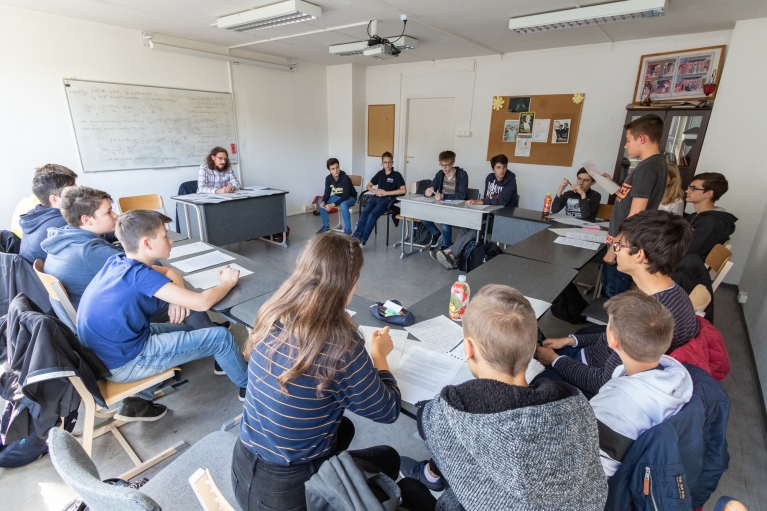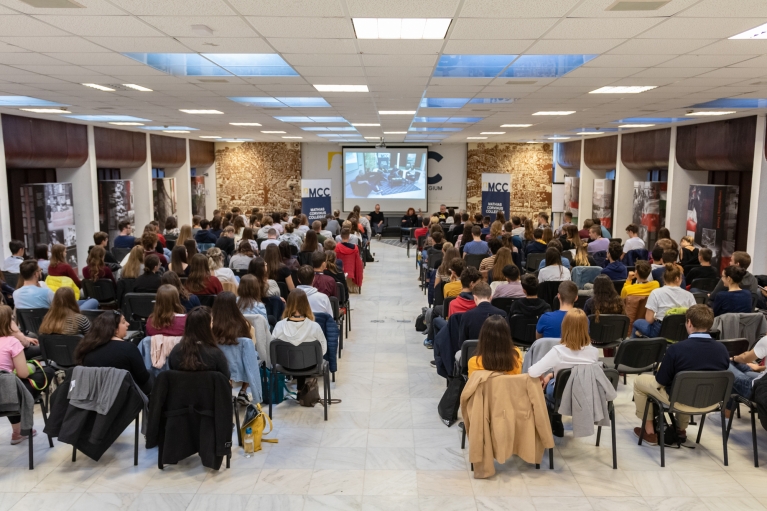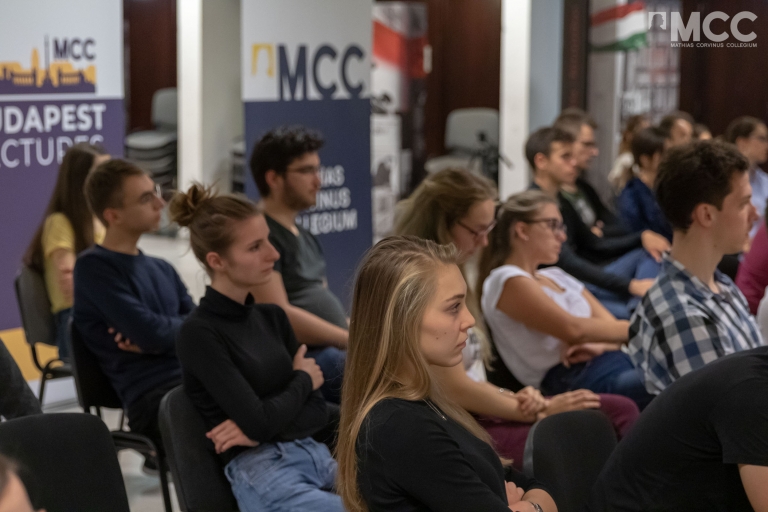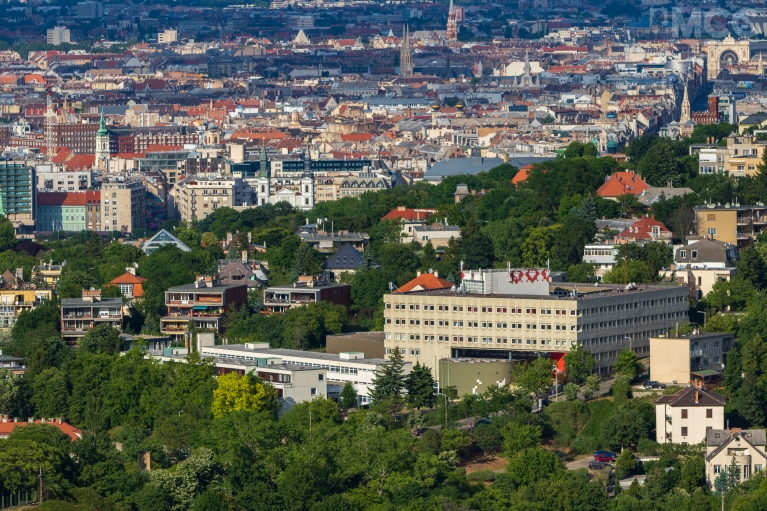The 1990s


Although Mathias Corvinus Collegium is now Central Europe’s largest educational institution and research center, our journey began with modest roots. Founded in 1996 by the Tombor family, MCC started with just a handful of students and faculty. Despite our small size, we were driven by a mission: to build an institution that supports Hungary’s most talented young people, inspiring them to create a better future for our country.
Initially, our programs focused on high school and university students, addressing Hungary’s need for hands-on professional development. Our students gained invaluable insights from accomplished professionals with successful careers both domestically and internationally. Early on, MCC also established in-house tutoring, launched a monthly lecture series featuring renowned speakers, and hosted study abroad opportunities—small yet pivotal steps that laid the foundation for our growth.
Today, MCC’s capacity has expanded significantly, but our vision remains steadfast. The guiding principles we embraced from the beginning continue to shape our approach as we prepare the next generation of leaders for Hungary and beyond.

Under the leadership of General Director Dr. Miklós Maróth, MCC took a significant step in September 2001 by opening its first residence hall on Gellért Hill, housing 47 students. This milestone marked a transformation from a classroom-based model to a community-based approach to education that remains central to MCC’s mission today.
In these early years, MCC offered two-year certificate courses across various disciplines, including law, economics, social sciences, international relations, and communication. Expanding our educational reach, MCC entered the book market as a co-publisher in 2008. Since then, we have published hundreds of titles in Hungarian, English, and German. Our goal is straightforward: for Hungarians to become well-rounded and knowledgeable citizens, they must have access to essential literature from Hungary and around the world.
In 2009, we introduced the Leadership Academy, providing students with the unique skills and perspectives essential for exceptional leadership. Although it has grown significantly since its inception, the Leadership Academy remains one of MCC’s most popular programs, preparing the next generation of Hungarian leaders with a broadened worldview and a commitment to excellence.

The 2010s marked MCC’s transformation into an international institution. With Hungary’s large and vibrant diaspora, we recognized that our mission to elevate the education, skills, and talent of Hungarians would extend beyond the country’s borders.
In 2013, we launched our first Transylvanian High School Program in Kolozsvár (Cluj-Napoca), followed by Székelyudvarhely (Odorheiu Secuiesc). This effort grew in 2018 with the addition of a University Program in Kolozsvár, strengthening our commitment to serve Hungarian communities abroad. In 2015, MCC opened its doors to elementary students through the Youth Talent Program, which provides young learners with practical skills beyond traditional school curricula, helping them discover their unique talents and fostering a strong foundation for future academic and professional success. For MCC, no age is too young to start preparing students for their futures.
In 2017, we broadened our program portfolio with public affairs training, beginning with the Transylvanian School of Politics. This program equips young Transylvanian Hungarians with leadership skills to represent and serve their communities effectively. Additional public affairs programs followed, including the Transcarpathian Public Leadership Training Program and the Women’s Public Leadership Program.
2018 marked further milestones with the introduction of the Roma Talent Program, designed to support the educational and professional growth of Hungary’s underprivileged Roma community. That year, we also expanded the University Program with the addition of a School of Psychology.
In 2019, MCC’s commitment to the study of public affairs took on new dimensions with the establishment of the MCC Research Institute, aimed at exploring contemporary social issues with academic rigor in accessible formats for the broader public. In the same year, we launched notable events like the MCC Budapest Summit and the Budapest Lectures, attracting scholars and experts worldwide. Additionally, the Debate Academy began in 2019 to foster dialogue, encouraging respectful and meaningful exchanges on pressing issues.

In June 2020, Hungary’s parliament recognized the impactful work of Mathias Corvinus Collegium by granting it a 10 percent stake in both MOL and Gideon-Richter. This support enabled MCC to secure ownership of its Somlói út campus and significantly expand its public activities, both domestically and internationally, ensuring the sustainability of its tuition-free programs. To strengthen our mission, MCC also underwent an organizational transition, with the founding Tihanyi Foundation replaced by the new Mathias Corvinus Collegium Foundation. Zoltán Szalai continues as Director General, with Dr. Balázs Orbán serving as Chair of the Board of Trustees.
In 2021, MCC embarked on unprecedented growth, highlighted by the launch of MCC Feszt in Esztergom—a three-day talent festival that drew over 12,000 attendees in its inaugural year and has since grown to over 50,000. MCC Feszt now attracts esteemed Hungarian and international speakers, including Tucker Carlson, Michael Knowles, Peter Frankopan, Samir Saran, Konstantin Kisin, and Dennis Prager, offering an enriching intellectual experience for all visitors.
As MCC undertakes new construction on its Somlói út campus, our Tas vezér utca location (in the former Flamenco Hotel) currently serves as MCC’s headquarters. MCC’s regional network has expanded to 33 cities across the Carpathian Basin and Europe. Our commitment to community engagement includes revitalizing historical buildings in these locations, bringing new life to structures that reflect each community’s heritage.
In the 2023-2024 academic year, MCC reached a new milestone with over 7,000 students enrolled in our programs. The 2020s also saw the launch of MCC’s first center outside the Carpathian Basin: MCC Brussels. Led by author and scholar Frank Furedi, MCC Brussels has quickly become a dynamic think-tank in the heart of Europe, fostering critical debates on issues shaping the continent’s future.
Looking ahead, MCC aims to support 10,000 talented students across 35 locations, furthering our mission to expand educational opportunities and prepare the next generation of leaders for Hungary and beyond.